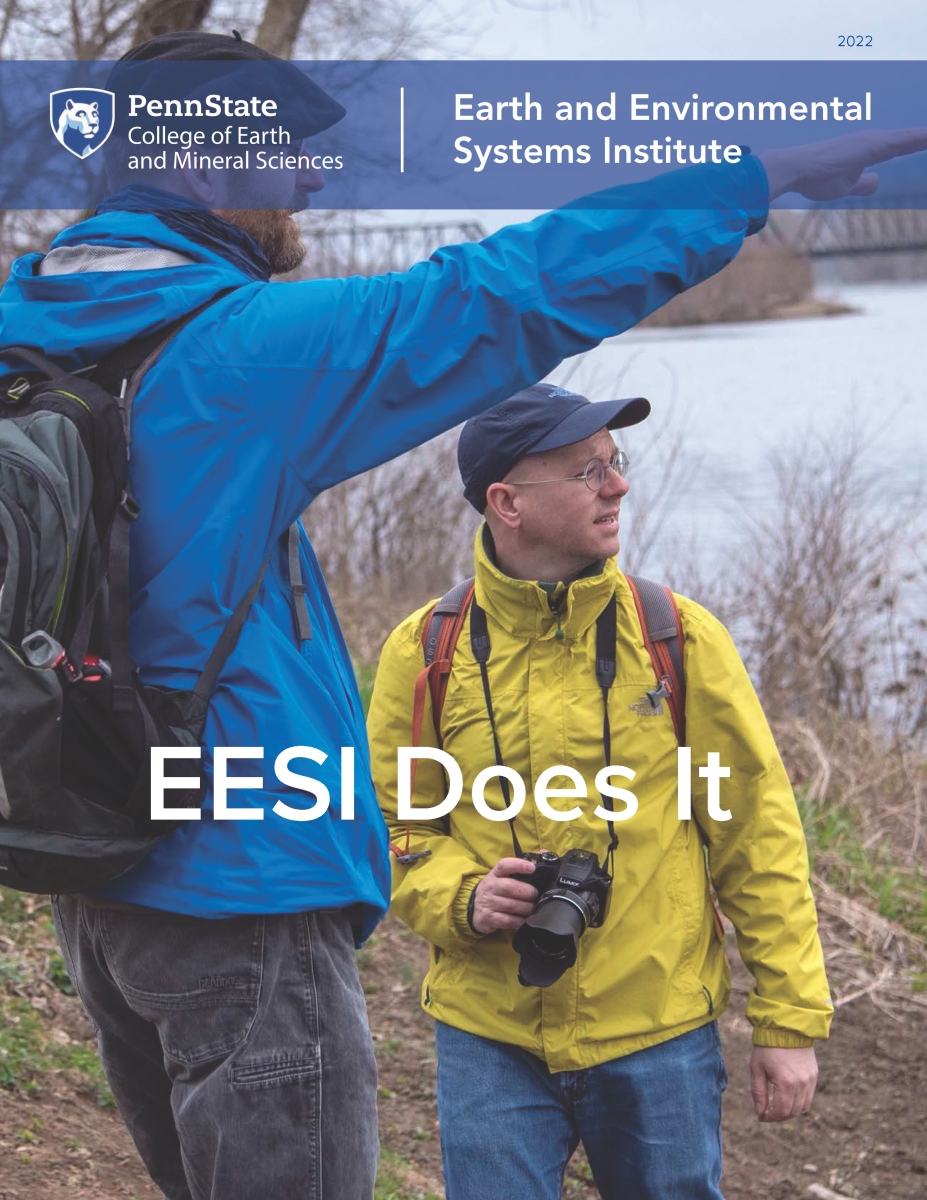Overview
Faculty-driven and directed, EESI centers are leaders in interdisciplinary, collaborative, and innovative research in the ever-changing environmental sciences. Researchers involved with the centers are engaged in understanding the earth system, how it affects people and how people affect it.
EESI centers and initiatives promote, conduct and coordinate interdisciplinary research and educational activities within environmental sciences/engineering/social sciences. Centers or initiatives are selected in a competitive process that occurs every three years. Centers receive funding awards from EESI from $5,000 to $15,000 per year for their activities.
The last call for center proposals before 2024 occurred in Spring 2020. EESI runs this competition every three years to publicly discuss newly proposed centers and proposals for renewal of centers. If EESI likes a proposal for a new center, the team can become an “Initiative” and can work toward becoming a Center officially through Penn State OVPR.
Penn State University Guidelines for Research Institutes and Centers.


Research Centers and Initiatives Supported by EESI
The Political-Industrial Ecology Initiative at PSU embeds resource flows within their broader political economic and historic contexts in order to craft for environmentally just futures.
-
Alliance for Education, Science, Engineering & Design with Africa (AESEDA)
The Alliance for Education, Science, Engineering, and Design with Africa aims to bring communities together, inspire youth, and design solutions for an inclusive future. -
Center for Climate Risk Management (CLIMA)
The Center for Climate Risk Management catalyzes convergent research to inform climate risk management. -
Political Industrial Ecology (PIE)
The Political-Industrial Ecology Initiative at PSU embeds resource flows within their broader political economic and historic contexts in order to craft for environmentally just futures. -
Energy and Environmental Economics and Policy Initiative (EEEPI)
EEEPI supports and promotes integrative research at the boundary of economics, public policy, and engineered/environmental systems. -
Planetary System Science Center (PSSC)
- The Planetary System Science Center formerly known as Penn State Astrobiology Research Center (PSARC) fosters NASA-relevant research across Penn State, enabling effective collaboration related to the origin of life, life detection, life in extreme environments, and planetary science.
-
Penn State Ice and Climate Research Center (PSICE)
The Center for Penn State Ice and Climate Research integrates glaciology, seismology, modeling and climatology.
Former Research Centers and Initiatives within EESI
-
Center for Landscape Dynamics (CLD)
CLD is the "go-to" center for landscape science and decision making. -
Center for Earth System Modeling, Analysis, and Data (ES-MAD)
The Center for Earth System Modeling, Analysis and Data builds bridges between the climate science community and the broader research community. -
Earth System Science Center (ESSC)
ESSC maintains a mission to describe, model, and understand the Earth's climate system. -
Marcellus Center for Outreach and Research (MCOR)
The Marcellus Center for Outreach and Research will be the research, information, and education leader for the Appalachian region by fostering, supporting, and advancing research and research-based outreach on shale gas development.
Federally Funded Initiatives
-
Shale Network
Shale Network is a collaborative effort between Penn State, the University of Pittsburgh, and the Consortium of Universities for the Advancement of Hydrologic Sciences Inc. (CUAHSI) to collect and analyze data on water quality in the Marcellus Shale drilling region. The network holds an annual workshop every May in State College, Pennsylvania. -
CZO - Susquehanna Shale Hills Critical Zone Observatory (Penn State)
The Susquehanna Shale Hills Critical Zone Observatory is part of a National Science Foundation-funded program to study how fresh water affects surface processes. -
LandscapeU
LandscapeU is a National Science Foundation Research Traineeship to train next generation scholar-practitioners. Trainees work on problems related to the food-energy-water nexus in the Chesapeake Bay and globally, exploring intersections of how these systems are intertwined over space and time. -
PA Space Grant Consortium
The PA Space Grant Consortium is part of a national network of Space Grant programs in every state, the District of Columbia, and Puerto Rico. It is funded and managed by the National Aeronautics and Space Administration (NASA). -
Program on Coupled Human and Earth Systems (PCHES)
PHCES is a project, funded by the U.S. Department of Energy, looking to create a state-of-the-art framework of computational tools that will help to assess the impacts of weather-related variability and change.
EESI Facilities
-
Laboratory for Isotopes and Metals in the Environment (LIME)
Supported by Institutes of Energy and the Environment (IEE) and Earth and Environmental Systems Institute (EESI), this laboratory supports faculty and student research and has the following shared equipment: Inductively Coupled Plasma - Atomic Emission Spectrometry (ICP-AES, also referred to as OES for Optical Emission Spectrometry); Inductively Coupled Plasma - Mass Spectrometry (ICP-MS); Multiple Collector Inductively - Coupled Mass Spectrometry (MC-ICP-MS); Elemental Analyzer - Isotope Ratio Mass Spectrometer (EA-IRMS); and Gas Chromatograph (GC-FID).
Community Initiatives
-
Centre County Pennslyvania Senior Environmental Corps (CCPaSEC)
CCPaSEC is a watershed monitoring group staffed by senior citizens who sample and publish data on the water quality of streams in Centre County. The Laboratory for Isotopes and Metals in the Environment analyzes monthly water samples for pH and a suite of cations and anions and then reports the results to the group, which makes them available online. CCPaSEC is part of the ClearWater Conservancy and works with the Pennsylvania Department of Environmental Protection, Centre County Conservation District, and the Retired and Senior Volunteer Program of Centre County, as well as other environmental groups. Researchers from EESI and Mohamed Khalequzzaman, professor of geology, Lock Haven University, advise the group.
Funding Awards (Archive)



